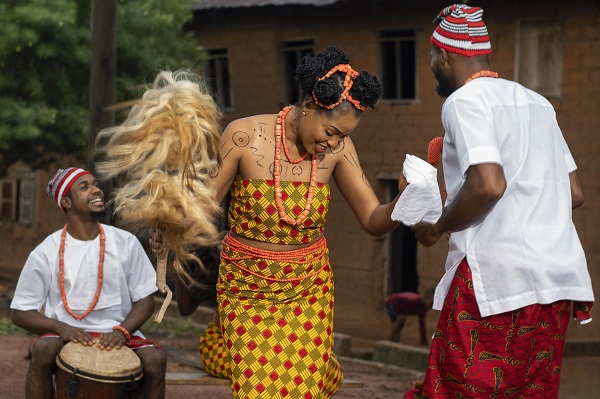- Home
- Arts & Beauty
- Business & Finance
- Culture & Heritage
-
E-Books
- Education subjects
- Good sex
- Media & Communication
- Motivational Inspirational
- Politics & Governance
- Relationships
- Technology
- Education
- Entertainment
-
Jobs
- Admin & MGT
- Civil Society jobs
- Company jobs
- Consultancies & Tenders
- Development work
- East Africa Jobs
- Education jobs
- Engineering jobs
- Finance & Accounting
- Full Time Jobs
- Part time jobs
- PR, Journalism, Communication
- Public Service jobs
- Social work
- Sumbit a job
- Technology jobs
- Uganda Jobs
- Volunteer jobs
- Latest Uganda News
- Live Coverage
- Live Video Channel
- Politics
- Public Platform
- Regional
- Scholarships
- Science & Technology
- Society & Leisure
- Sports
- Stories Unusual
- Travel & Tourism
Uganda's Music: Tradition to Modernity

Take a journey into the heart of Uganda and explore its vibrant and influential music culture.
From the traditional Ganda beats of Kadongo Kamu to the modern sounds of dancehall and hip-hop, Uganda's musical landscape has been shaped by its diverse ethnic groups and tribes.
Its music is a symbol of progress and social change, with concerts and celebrity culture providing an outlet for expression.
So buckle up and let's explore the evolution of Ugandan music, from tradition to modernity - a journey that will leave you feeling inspired and empowered.
Key Takeaways
-
The Ugandan music industry is vibrant and influential in social and economic lives, with musicians using music to promote social and economic change.
-
The Kadongo Kamu genre, which emerged from traditional Ganda Music, is the most influential style of music in Uganda, although it has been marginalized in favor of more recent music styles.
-
The Kidandali genre is currently the most popular genre in Uganda, being a modern style of Kadongo Kamu. Artists like Bobi Wine, Dr Jose Chameleone, and Bebe Cool are renowned in this genre.
-
Dancehall, modeled after Jamaican Dancehall, is influential in the Ugandan pop music industry, with artists like Chameleone, Bebe Cool, and Bobi Wine consolidating the genre.
Kadongo Kamu
You're invited to explore Uganda's premier traditional genre, Kadongo Kamu, which has been inspiring the country since its emergence.
This genre has preserved the traditional music of Uganda and is still influential in the modern music scene. It emerged from Ganda music and was dominated by legendary musicians such as Peterson Mutebi and Dan Mugula.
The music has a distinct sound as the bass guitar plays a major role. Despite its impact, Kadongo Kamu has been marginalized in favor of more recent music styles.
Nevertheless, its legacy remains strong and continues to shape Ugandan music today.
Kidandali
Moving on to the most popular genre in Uganda today, Kidandali is the modern style of Kadongo Kamu. Pioneered by bands like The Cranes and Afrigo Band, the evolution of this music is credited to the Eagles Production label.
Kidandali has had a profound impact on Ugandan society, with artists like Bobi Wine, Dr Jose Chameleone, and Bebe Cool renowned for their work. The genre is marked by bass guitar playing a significant role, mixed with English and Swahili.
Kidandali has become a powerful force for popular culture, with companies sponsoring concerts and advertisements on radio and television. Its influence has continued to grow, as it remains the most popular genre in Uganda.
Dancehall
Following on from Kidandali, Dancehall is a genre modeled after Jamaican Dancehall that has become influential in the Ugandan pop music industry. Artists like Shabba Ranks and Buju Banton inspired Ugandan artists, with the Dem Bow beat becoming the foundation of Ugandan dancehall.
Artists like Chameleone, Bebe Cool, and Bobi Wine have consolidated the genre and made it the most popular music style in the country. The influence of Jamaican Dancehall in Uganda is evident in the evolution of Dancehall in the Ugandan music scene.
Dancehall has become a style that accommodates all artists, with musicians experimenting with different languages and styles. In particular, the use of Swahili and a mix of Luganda and English has helped reach a wider audience.
Concerts and Celebrity Culture
Music concerts, or album launches, have become popular events in Uganda, where musicians are the main celebrities. Social media has had an immense impact on the celebrity culture in Uganda, with fans closely following and engaging with their favourite musicians.
Companies are also willing to sponsor concerts, a sign of the economic significance of the music industry in the country. These events are a great opportunity for fans to connect with their favourite musicians and experience the music in a different atmosphere. Furthermore, concerts are a great platform for artists to promote their music and for companies to advertise their products.
The success of a concert depends on the artist's ability to draw a large crowd, and the popularity of a musician is often measured by the number of tickets sold. The music industry in Uganda is a vibrant and influential one, with concerts being an integral part of the culture.
Hip-Hop
You can hear the influence of American hip-hop in Uganda, as local youth have embraced the culture. Klear Cut and Bataka Squad were among the first hip-hop groups in Uganda, paving the way for GNL Zamba to popularize the genre in 2008.
Despite initial resistance, artists like Navio and Babaluku persisted, and today Keko and Navio are two of the most influential hip-hop artists in Uganda.
Hip hop has had a major impact on Ugandan youth culture, introducing a new sound and aesthetic. It has also evolved over time, incorporating more Ugandan influences and elements, and becoming a key part of the country's music industry.
Gospel and Jazz
You can experience the power of traditional and modern Ugandan music genres by listening to gospel and jazz.
Gospel music in Uganda has grown significantly since the 1990s, with artists like Judith Babirye and Pastor Wilson Bugembe gaining popularity. Beyond church walls, gospel has had an impact on many Ugandans.
Jazz music, while not as widely spread, is still a presence in Uganda. Musician Isaiah Katumwa has held concerts to educate Ugandans about jazz, and Fusion Band is one of the respected jazz bands in the country. International jazz musicians have paved the way for local talent to flourish.
As gospel and jazz continue to evolve in Uganda, they're sure to have an impact that will be felt for years to come.
Conclusion
Uganda is an amazing place, full of musical diversity that ranges from traditional Ganda music to modern hip-hop and dancehall.
Music has been used as a form of expression and a means to promote social and economic change.
This article has shown how Ugandan music has evolved over time, from its traditional roots to modern celebrity culture and concerts.
Uganda is a vibrant and influential hub for music in Africa, and its music will continue to be embraced by people around the world.









Recent Comments